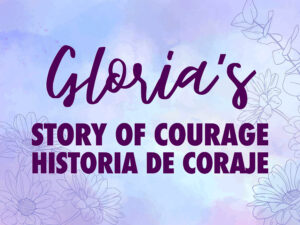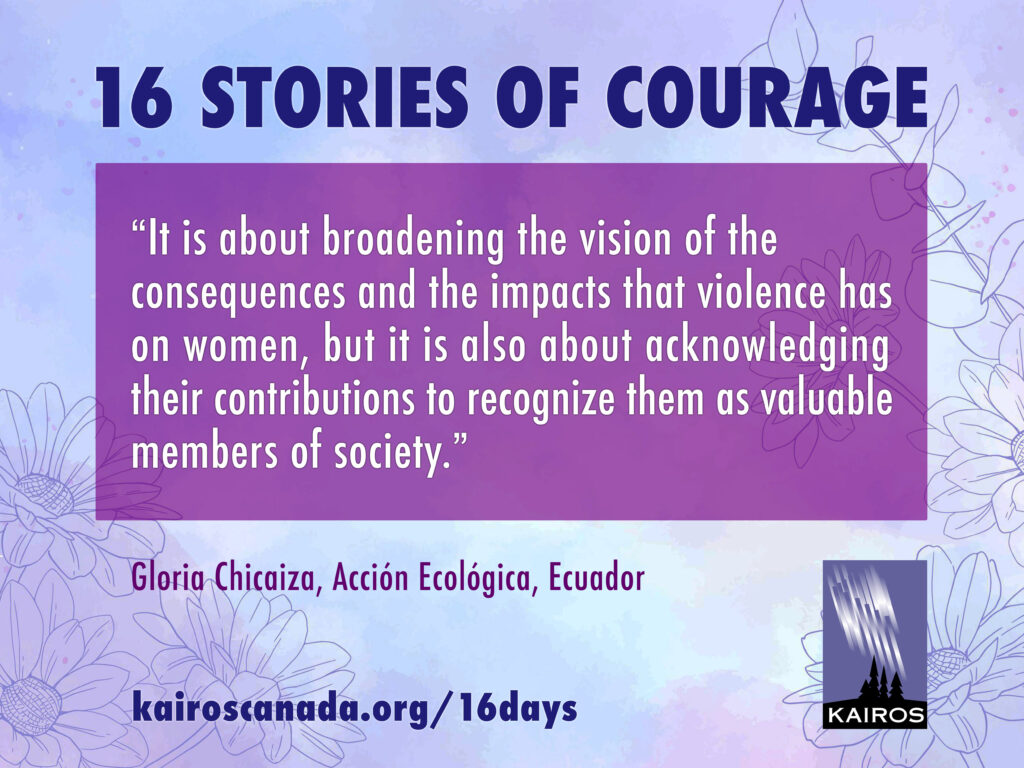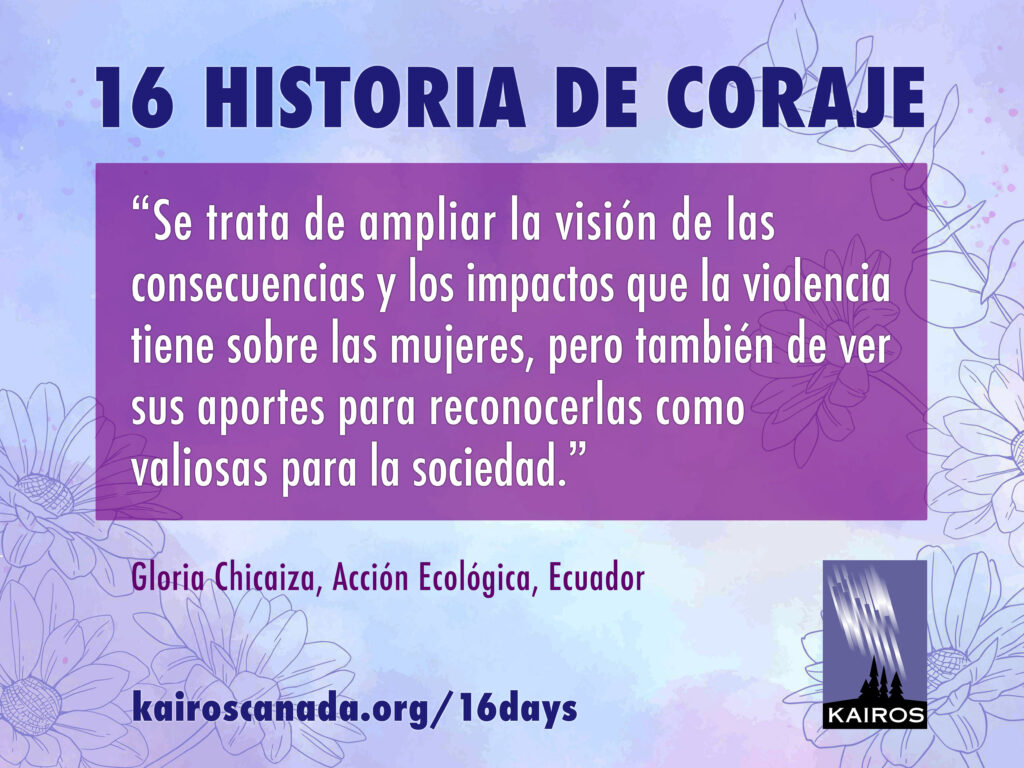Gendered impacts of resource extraction #16StoriesofCourage

| en español |
The negative impacts of large-scale resource extraction materialize in the form of violence against the land and also against women. In Intag, Ecuador, communities came together in defense of the land and water and passed a municipal ordinance declaring the area free of mining—a first in Latin America; and women were key to this achievement.
Excerpts from the report Íntag: Una Sociedad que la Violencia No Puede Minar (Intag: A Society that Violence Cannot Mine).
Although the conflict over mining has been the constant that has conditioned the life of the population of Íntag, Ecuador, the community’s organizational capacity and its clarity in choosing life has made it a national and international reference for sustainable life proposals. These proposals include, among others, a mini energy generator project, a project that has not been able to be implemented due to governmental obstacles (Energies Sans Frontieres, 2009) as well as a network of agroecological organizations that guarantee the community’s food sovereignty, including through the export of organic certified fine coffee.
At public mobilizations, women challenge their traditional roles, taking an active role in the demand for human rights. Women’s affective logics become engines of struggle.
“Women who oppose mining are joined by a common bond” (Family 17).

It is pertinent to highlight the leading role of women who are:
- Managers of four women-run companies of clean and equitable production, such as: “The Workshops of the Great Valley” that create products made from the Luffa plant; “Women’s Association of El Rosal” that produce cosmetics from aloe vera; “Artisanal Association of Women and the Environment” that transform the natural fiber of the fique plant; and the “Association of the Women of Intag (GADI)” that make sportswear and offer experiential-based tourism.
- Advocates of the Ecotourism Network of Intag that promotes environmental and community tourism.
- Leaders and members of the Assembly of the District of Cotacachi (AUCC), a space of construction and monitoring of public policy that for the past 19 years has supported the defense of Íntag against extractive activities. Through the AUCC’s efforts, Cotacachi was declared a “Healthy and Ecological District” free of mining though a municipal ordinance in 2001, the first of its kind in Latin America.
- Facilitators of training and human and environmental rights, and mining justice workshops.
A feminist approach ensures that the impacts of political violence are analyzed through a lens on the structural conditions of subordination and historical discrimination of women, which are aggravated by political violence and the actions of the state.
It is important to consider the violations and their respective impacts not only to make visible or denounce the horror, but to understand more clearly the experience of the affected women; this understanding supports them in their defense of their rights and makes their proposals visible.
“When the police entered, we made a chain of women, and they were with shields and helmets, they beat us” (Family 23).
It is also necessary to make visible women’s courage to defend their loved ones, to resist abuses, and especially their ability to transform themselves and social life around them—after and despite violence. It is about broadening the vision of the consequences and the impacts that violence has on women, but it is also about acknowledging their contributions to recognize them as valuable members of society.
Learn more about the Impacts on the Lives of the Women of Intag and Gender-based Analysis
Los impactos diferenciados del extractivismo
Los impactos negativos del extractivismo se materializan en forma de violencia contra el territorio y también contra las mujeres. En Intag, Ecuador, las comunidades se unieron en defensa del territorio y el agua y aprobaron una ordenanza municipal que declaraba el área libre de minería, una novedad en América Latina; y las mujeres fueron clave para este logro.
Extractos del informe Íntag: Una Sociedad que la Violencia No Puede Minar.
Anique el conflicto minero ha sido la constante que ha condicionado la vida de la población de Íntag, Ecuador su capacidad organizativa y su claridad de opción de vida, les ha constituido en un referente nacional e internacional por sus propuestas de vida sustentables. Estas propuestas incluyen entre otras un proyecto de mini generadores energéticos, proyecto que no ha podido ser ejecutado por trabas gubernamentales (Energies Sans Frontieres, 2009) o una red de organizaciones agroecológicas que garantizan la soberanía alimentaria de las comunas, quienes incluso exportan café fino de aroma con certificación Bio.
Cuando se dan movilizaciones en espacio públicos las mujeres están cuestionando sus roles tradicionales, asumiendo un papel activo en la reivindicación de derechos humanos. Las lógicas del afecto en las mujeres se convierten en motores de lucha.
“Las mujeres que nos oponemos a la minería siempre estamos juntas” (Familia 17).

Es pertinente destacar el rol protagónico de las mujeres quienes son:
- Gestoras de cuatro empresas asociativas de mujeres de producción limpia y equitativa como son: “Los Talleres del Gran Valle” que elabora productos de la planta llamada Lufa. “Asociación de Mujeres El Rosal” que produce cosméticos en base a Aloe-Vera. “Asociación Artesanal Mujeres y Medio Ambiente” que transforma la fibra de la Cabuya. “Asociación de Mujeres de Íntag (GADI)” que confeccionan ropa deportiva, y ofrecen turismo vivencial.
- Promotoras de la Red Ecoturística de Íntag, que fomenta el turismo natural y comunitario.
- Lideresas e integrantes de la Asamblea de Unidad Cantonal de Cotacachi (AUCC), un espacio de construcción y seguimiento de la política pública que desde hace 19 años ha ratificado anualmente su apoyo a la defensa de Íntag ante actividades extractivas. Así logró en el año 2001, por primera vez en América Latina, que una ordenanza municipal declarase a Cotacachi “Cantón Ecológico y saludable” libre de minería.
- Dinamizadoras de talleres de formación y difusión de derechos humanos y de la naturaleza y de la problemática minera.
Un enfoque feminista asegura que los impactos de la violencia política se analicen desde las condiciones estructurales de subordinación y discriminación históricas de las mujeres que se ven agravadas por la violencia política y por las actuaciones del Estado.
Es importante tener en cuenta las violaciones y sus respectivos impactos no solo para visibilizar o denunciar el horror, sino para entender de manera más clara la experiencia de las mujeres afectadas, y que esta comprensión contribuya a defender sus derechos y visibilizar sus propuestas.
“Cuando entraron los policías hicimos una cadena de mujeres y ellos estaban con escudos y cascos, nos golpearon” (Familia 23).
También hay que hacer visible el coraje de las mujeres para defender a sus seres queridos, para resistir los abusos y sobre todo su capacidad de rehacerse y rehacer la vida social a su alrededor, después y a pesar de la violencia. Se trata de ampliar la visión de las consecuencias y los impactos que la violencia tiene sobre las mujeres, pero también de ver sus aportes para reconocerlas como valiosas para la sociedad.








